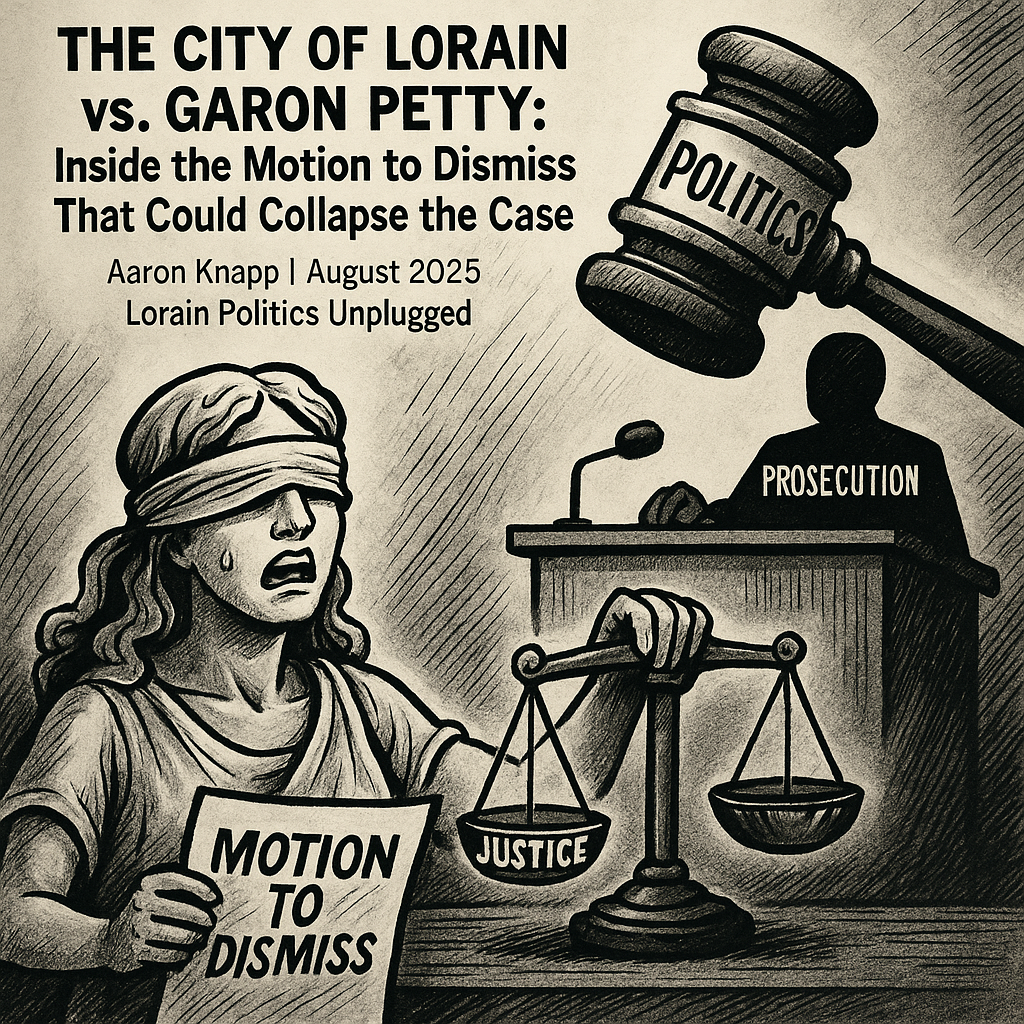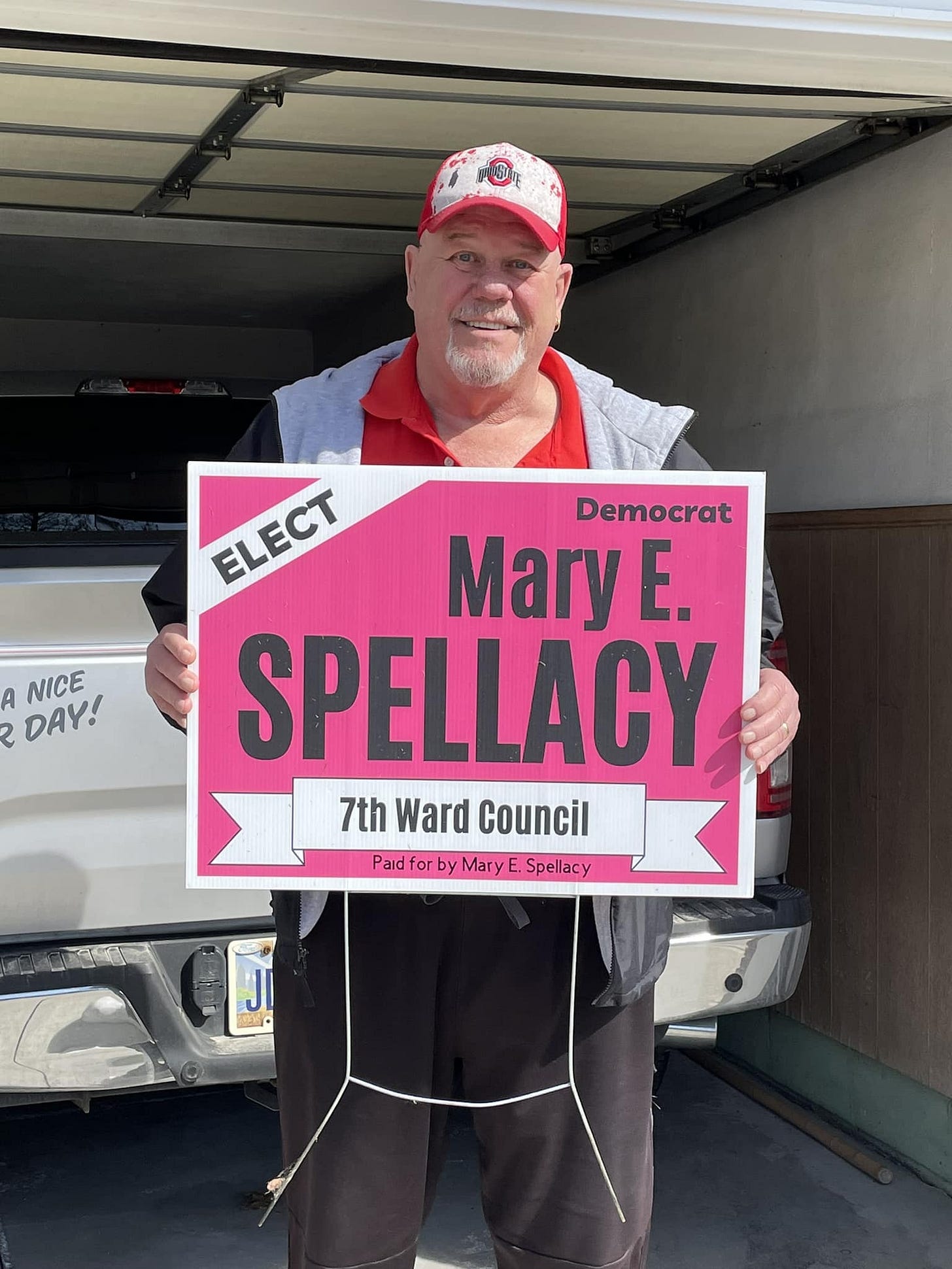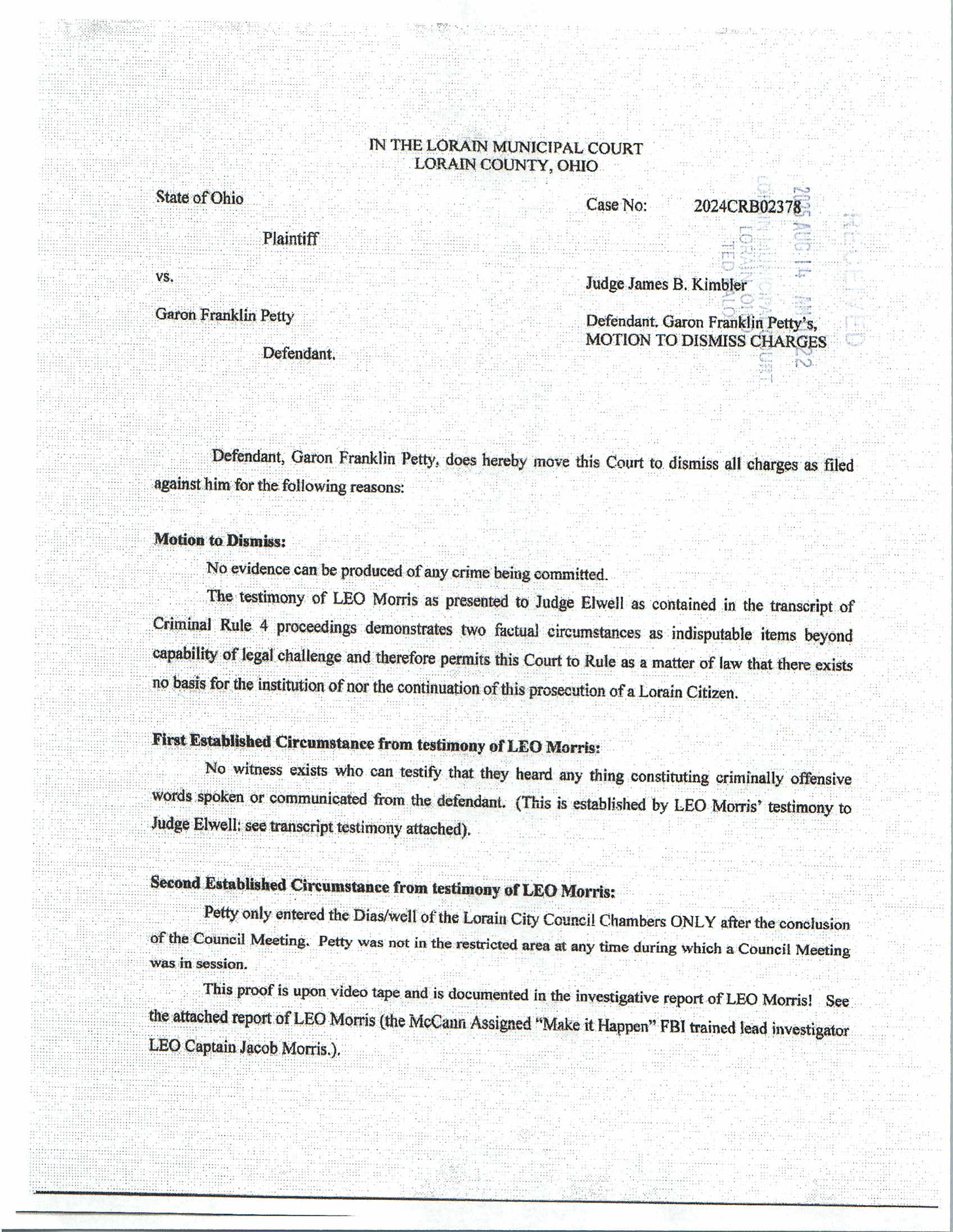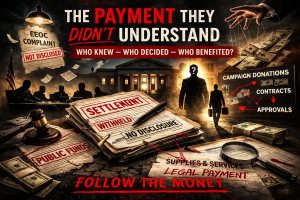The City of Lorain vs. Garon Petty: Inside the Motion to Dismiss That Could Collapse the Case

By Aaron Knapp | August 2025 | Lorain Politics Unplugged
Aug 16, 2025

When Prosecution Becomes Politics—And Discovery Becomes Leverage
It’s been over a year since Garon Petty was charged with a list of offenses for what witnesses—and now court filings—suggest was nothing more than a nonviolent walk to the Council floor after a meeting. But the newly filed Motion to Dismiss turns that entire narrative inside out.
Thanks for reading Aaron’s Substack! Subscribe for free to receive new posts and support my work.
Filed August 15, 2025, the motion doesn’t simply poke holes in the facts. It lays out a constitutional indictment of the city’s handling of the case—from the moment charges were pushed by council insiders, to the selective release of evidence, to the use of intimidation laws as a political weapon.
But even more disturbing: some of the most critical records in this case were handed to me—a journalist—before they were provided to Petty’s legal team. That detail isn’t hearsay. It’s documented. And the reason why is more politically revealing than anyone at City Hall wants to admit.

The Leak That Wasn’t: Why I Got the Case File Before the Defense Did
Let’s get one thing straight: the city didn’t give me the Garon Petty file to harm Petty. They gave it to me because Council made the Chief look bad—and the Chief retaliated.
Back in July 2024, just after the charges were filed, City Council released a now-notorious internal email from Chief James McCann. In that message, McCann resisted pressure to immediately criminalize dissent at Council meetings:
“The police don’t enforce Council rules… they are most likely getting arrested or getting a summons.”
Translation? You can’t arrest someone in City Hall just for challenging elected officials.
That email made its way to Garon Petty and others. And from all indications, the Chief was furious. Because shortly after that, he reversed course—allegedly at Council’s request—and ordered a full-blown investigation into Petty anyway.
Days later, I received a full, unredacted packet of police reports, body cam logs, and internal statements—all compiled before even preliminary hearings had occurred. Lt. Jacob Morris told me directly:
“Chief told me to give it to you. We know you’ll put it online.”
Let that sink in: I wasn’t the defendant. I wasn’t the attorney. But I had the full file.
This wasn’t justice. It was punishment. Not aimed at Petty—but at Council. The message was clear: you embarrassed me, so here’s your problem dumped into the public eye.
Chief McCann likely thought the file would implode the case. It should have. The conflicting narratives, the lack of clear threats, the sheer vagueness of the claims—it all pointed to selective enforcement. But instead of backing off, the Law Department doubled down, pushing forward with prosecution even as key officials—including Riley, Radeff, and the Law Department…recused themselves.
And today, more than a year later, Petty’s legal team still hasn’t received all of what I was given in one envelope.
That’s not a process error. That’s due process abuse.
Six Legal Strikes: What the Motion to Dismiss Says
Petty’s defense attorneys are now challenging the entire prosecution on six major grounds. The motion argues that the charges—aggravated trespass, intimidation, and menacing—fail to meet statutory elements. The facts simply do not support the notion that Petty crossed into a restricted workspace or issued a specific, credible threat to any public official. The area where he walked had no barriers, was accessible to the public both before and after prior meetings, and Petty was between fifteen and twenty feet from the Clerk when he made his statement.
The filing points to selective prosecution by highlighting the city’s refusal to charge others for far more egregious council disruptions. It also raises vagueness and overbreadth concerns about how disorderly conduct and intimidation statutes are being applied to constitutionally protected speech. Most importantly, it outlines how the City of Lorain has used criminal process as a substitute for political accountability—launching the case at the insistence of councilmembers who later recused themselves.
The motion states plainly that the prosecution lacks a lawful basis, violates Petty’s First and Fourteenth Amendment rights, and constitutes a retaliatory abuse of governmental authority.
This Isn’t About Petty. It’s About Power.
What’s happening to Garon Petty could happen to anyone. And what happened to me already did. The parallels are no longer theoretical—they’re factual. They trace the contours of a system that has been quietly reengineered not to uphold justice, but to preserve political control and punish dissent.
In my case, back in 2023, Chief James McCann deliberately circulated defamatory and false statements about me—sending emails to court administrators, professional licensing boards, and even third parties unrelated to any official investigation. These weren’t procedural updates. They were calculated acts of reputational sabotage, dressed up as public safety concerns. McCann described me as “unhinged,” hinted at mental instability, and implied that I was a professional threat—all without any substantiated evidence or proper review. He took what should have been internal deliberations and laundered them through unofficial channels to discredit me not just publicly, but professionally. These messages were sent during an active campaign of retaliation—and they had consequences. I lost work, I lost credibility in some circles, and I had to fight for months to expose the truth.
Now I watch as the same tactics are deployed against Garon Petty.
The method is eerily familiar: internal emails circulated to shape a narrative before a single court filing occurs, evidence withheld from defense counsel while being funneled to outside observers, and vague, contradictory police statements later used to support overblown criminal charges. In both cases, the city didn’t just violate norms…it rewrote them.
The public still hasn’t seen the full scope of how city officials initiated Petty’s prosecution. But what we do know is damning. Witnesses with direct involvement later recused themselves. Police officers involved in the investigation shifted their narrative under pressure. Discovery materials were shared with me—an outside party not connected to the case—while Petty’s legal team remained in the dark.
This isn’t about decorum at council meetings. It isn’t about rules of order or preserving peace in public spaces. This is about a city government that treats the justice system like a hammer—and uses it to silence or punish those who embarrass them, expose their contradictions, or fail to fall in line. When a private citizen becomes a political inconvenience, prosecution becomes the punishment. When Council members make the Chief look weak, he responds by flipping the table.
Garon Petty isn’t the exception. He’s the template. The question now isn’t whether the charges will be dismissed. The question is how many more people need to be targeted, discredited, or investigated before we call this what it is: a coordinated misuse of power to criminalize dissent.
Final Thought: If This Is Justice, Then Who’s Watching the Watchmen?
This case was never just about Garon Petty—and it was never just about one outburst at a Council meeting. It’s about what happens when power gets so comfortable in its own echo chamber that it no longer fears scrutiny, no longer tolerates dissent, and no longer bothers hiding the strings it pulls behind the curtain.
The Chief didn’t give me the file because I’m special. He gave it to me because I’m inconvenient. Because I publish what others suppress. Because Council embarrassed him with the truth, and retaliation was the only language he had left.
And that’s the part the public can’t afford to miss.
When evidence flows faster to reporters than it does to defense attorneys—when investigations begin at the request of politicians, then handed off to police officers who later recuse themselves—we aren’t watching a justice system at work. We’re watching power protecting itself.
Even now, Councilmember Mary Springowski—one of the original voices demanding accountability—still hasn’t turned over the video evidence she publicly claimed to have. A video she said captured the incident. A video that could confirm or destroy the city’s case. She said she had it. She still hasn’t produced it. And no one in power seems interested in forcing the issue.
Instead, when the city believed I had that video, prosecutors went after me. First it was Assistant Prosecutor Rocky Radeff, who issued a subpoena duces tecum trying to force me to turn over materials I never had. Then Patrick Ward, the newly appointed outside prosecutor, subpoenaed me twice—desperately searching for evidence that didn’t exist.
They had no idea I fabricated the story on Facebook as bait—to see who was watching me.
And just like that, the mask slipped. I wasn’t a journalist in their eyes. I was a threat. A witness to their hypocrisy. An obstacle to their narrative.
So while a sitting councilmember withholds possible exculpatory evidence, the full force of the city’s legal machine was aimed at silencing me—not to protect the public, but to protect themselves.
I’ve covered every inch of this case. I’ve printed the emails. I’ve tracked the reversals. I’ve confronted the double standards. And I’ve seen—firsthand—how officials weaponize confusion, delay, and selective enforcement to punish not just their critics, but anyone who reminds them they answer to the public.
This is a government that fears embarrassment more than it fears being wrong.
And if that doesn’t terrify you, it should.
Because today it’s Petty. Last year it was me. And next time—it could be you.




